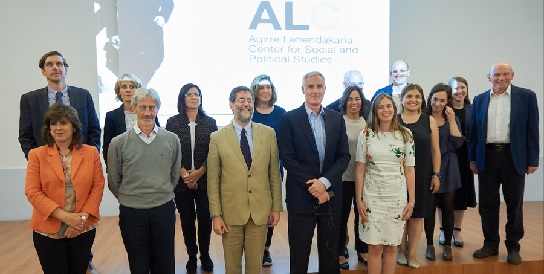From AC4's Website:
AC4 Presents on Sustainable Human Development in the Basque Country
In collaboration with the Agirre Lehendakaria Center for Social and Political Studies (ALC), AC4Executive Co-Chair Dr. Peter T. Coleman and Director Dr. Josh Fisher recently discussed their work on sustainable human development and sustainable peace at several seminars in the Basque Country.
On June 15, 2016, Dr. Coleman and Dr. Fisher were featured speakers at a seminar held at the Donostia International Physics Center (DIPC) in Donostia/ San Sebastián the province of Gipuzkoa. This seminar, organized jointly by the ALC, the DIPC, and the Provincial Council of Gipuzkoa, was titled “Social and Scientific-Technical Knowledge at the Service of Sustainable Human Development.” The seminar was intended as a space for experts in both the social sciences and physical/technical sciences to discuss the pursuit of sustainable human development across disciplines.
 Click the link below for the full article: http://ac4.ei.columbia.edu/2016/07/12/basque-presentations/
Click the link below for the full article: http://ac4.ei.columbia.edu/2016/07/12/basque-presentations/ Click the link below for the full article: http://ac4.ei.columbia.edu/2016/07/13/peace-mapping-in-the-basque-country/AC4 Executive Co-Chair Peter T. Coleman, Program Manager Jaclyn Donahue, Director Josh Fisher and Project Coordinator Kristen Rucki recently visited the Basque Country in order to advance the community-based learning and validation component of the Sustainable Peace Initiative, currently in its pilot phase. The goal of this process, known as ground-truthing, is to use a participatory methodology, including narrative-based discussion and engagement with mapping and visualization, to explore several questions, including:
Peace Mapping in the Basque Country
- How can context-specific knowledge and the expertise of local stakeholders validate and/or refine AC4’s scientific understanding of sustainable peace?
- How can AC4’s generalized scientific map of sustainable peace and the visualization process be used to provoke new questions, stimulate discussion, and inform effective policies and practices for sustaining peace locally?
Photo Credit: AC4
